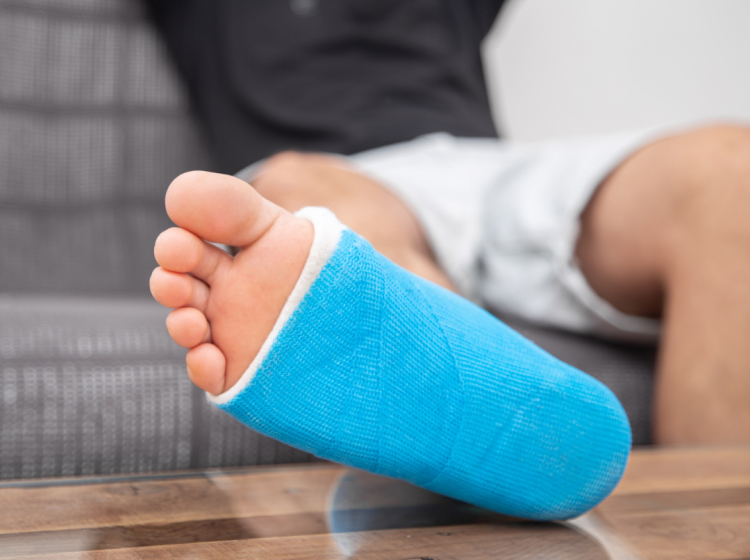Snapping Peroneal Tendon Specialist In Singapore

Dr Wang Lushun
Senior Consultant Orthopaedic Surgeon
MBBS (Singapore)
MRCS (Edin)
MMed (Ortho)
FRCS (Ortho) (Edin)
- Walk without pain again by treating your snapping peroneal tendons
- Fellowship-trained orthopedic surgeon
- Internationally recognised, more than 1500 surgeries performed



What are Snapping Peroneal Tendons?
Snapping peroneal tendons is a condition where the peroneal tendons in the ankle snap or shift out of place. This issue typically occurs in athletes or individuals with repetitive ankle movements. Sometimes, it’s a symptom of an underlying ankle instability or injury. If left untreated, they may cause:
- Increased pain and discomfort during daily activities
- Development of chronic ankle instability
- Accelerated wear and tear of the joint, resulting in arthritis
- Reduced overall function and strength of the ankle
Symptoms of A Snapped Peroneal Tendon
A snapped peroneal tendon can cause various symptoms, making it difficult to identify without proper examination. Consult an orthopaedic specialist if you’re experiencing the following signs:
Pain and swelling of the ankle
This occurs because the tendons are irritated or inflamed due to snapping out of their normal position.
Snapping or popping sensation during movements
The tendons may snap over the bone or other structures, causing an audible or palpable sensation during movement.
Ankle instability or weakness
The peroneal tendons play a crucial role in ankle stability, so damage to these tendons may result in a feeling of instability or weakness.
Difficulty bearing weight
A snapped peroneal tendon can make it challenging to put weight on the affected foot, resulting in a limp or difficulty walking.
Enjoy your favourite activities without pain and discomfort.
Get ankle diagnosis and treatment today.
Get ankle diagnosis and treatment today.
Restore your mobility and improve your ankle health while preventing further damage and lasting health issues.
Proper diagnosis and treatment for your snapped peroneal tendon will help you regain your ankle strength and flexibility, so you can reclaim your active lifestyle.
Am I A Candidate for
Snapping Peroneal Tendon Surgery?
To determine whether surgery is the best course of action for your case, your orthopaedic specialist will need to consider your individual needs and examine several factors about your condition, such as:


Can snapping peroneal tendons be treated without surgery?
Yes, non-surgical treatment options for snapping peroneal tendons include rest, ice, compression, elevation (RICE), anti-inflammatory medications, physical therapy, and bracing. These conservative treatments can alleviate pain and improve ankle stability, but surgery may be necessary if symptoms persist or worsen.
Can snapping peroneal tendons lead to ankle arthritis?
Yes, untreated snapping peroneal tendons can result in accelerated wear and tear of the joint, leading to ankle arthritis. Early diagnosis and treatment are essential to prevent long-term complications and maintain ankle health.
When Is The Best Time To Have Snapping Peroneal Tendon Surgery?
Surgery for snapping peroneal tendons should be considered when the condition is affecting daily life and conservative treatments like rest, physical therapy and bracing haven’t provided relief. Surgery could also be a suitable option if there's persistent ankle instability, weakness or difficulty bearing weight on the affected foot. Ultimately, your orthopaedic surgeon will decide the optimal treatment for your case.
Snapping Peroneal Tendon Surgery Recovery Process
| Recovery Period | What to Expect: |
|---|---|
| Immediately after surgery (Week 0-2): |
|
| First few weeks after surgery (Week 2-6): |
|
| Several weeks after surgery (Week 6-12): |
|
| Several months after surgery (12 weeks onwards): |
|


Dr Wang Lushun
Senior Consultant Orthopaedic Surgeon
MBBS (Singapore)
MRCS (Edin)
MMed (Ortho)
FRCS (Ortho) (Edin)
Internationally Recognised & Double Fellowship-Trained Surgeon With Over 18 Years of Experience
- Bachelor of Medicine & Bachelor of Surgery (MBBS),
National University of Singapore - Member of The Royal College of Surgeons (MRCS),
Edinburgh, United Kingdom - Master of Medicine in Orthopaedic Surgery (MMed),
National University of Singapore - Fellow of The Royal College of Surgeons in Orthopaedics and Traumatology (FRCS), Edinburgh, United Kingdom
As a Senior Consultant Orthopaedic Surgeon and former Head of the Hip and Knee Division in Ng Teng Fong Hospital, he has won awards for superior patient outcomes (value driven), service quality and enhanced recovery programmes. His patients include current and former national athletes and sporting professionals.
Why Choose
Dr Wang Lushun?
Trusted
Leadership on Orthopaedic Advisory Boards
Skilful
Double Fellowships at Centres of Excellence
Experienced
Senior Consultant with Over 18 Years of Experience
Can I Use Medisave For Snapping Peroneal Tendon Surgery?
Yes, you can use Medisave to offset the cost of your procedure.
Reach out to us today to learn more about payment options.
Patient-Centred Orthopaedic Care
We are dedicated to your recovery and well-being. Every patient deserves the freedom that comes with active living. Whether you're an athlete sidelined by an injury or a weekend hobbyist desperate to return to your passion, our mission is to help you regain your mobility and independence.
Personalised Approach For Positive Outcomes
Our clinic prioritizes time dedicated to understanding each patient’s injuries and needs. Dr Wang strongly believes that personalised care & patient management will lead to better outcomes & positive experiences.
Minimally Invasive Techniques For Faster Recovery
Dr Wang’s extensive experience with minimally invasive procedures allows for less scarring, lower risk of complications and faster recovery compared to traditional surgical methods.
Aftercare Focused On Restoring Mobility & Well-Being
As an avid sportsperson, Dr Wang understands the time and patience required to regain mobility and return to active living. After your procedure is completed, Dr Wang will make sure your recovery is smooth and comfortable.
Insurance
We accept all patients, with or without insurance plans. Additionally, we are on the specialist panels of these Health Networks/Insurance Plans. Please contact us if you have any queries and we will be happy to assist you in checking with your insurance provider.
Our Clinic Locations
3 Mount Elizabeth, #13-14
Mount Elizabeth Medical Centre
Singapore 228510
820 Thomson Road, Mount Alvernia Hospital, #05-51, Medical Centre D, Singapore 574623
Frequently Asked Questions
What causes snapping peroneal tendons?
Snapping peroneal tendons occur when the peroneal tendons in the ankle snap or shift out of place, typically due to overuse or trauma. Underlying ankle instability or injuries may also cause this issue.
How are snapping peroneal tendons diagnosed?
Diagnosing snapping peroneal tendons typically involves a physical examination by an orthopaedic specialist, who will assess your ankle’s range of motion, strength, and stability. Imaging tests, such as X-rays, MRI, or ultrasound, may be used to confirm the diagnosis and rule out other potential issues.
What are the risks associated with snapping peroneal tendon surgery?
As with any surgery, there are risks involved, such as infection, bleeding, nerve damage, and anaesthesia complications. Specific risks related to snapping peroneal tendon surgery include tendon scarring, persistent pain, and recurrence of instability or snapping.
How can I prevent snapping peroneal tendons?
To prevent snapping peroneal tendons, maintain ankle strength and flexibility through regular exercise, stretch before engaging in physical activities, and wear supportive footwear. It’s also crucial to address any underlying ankle instability and avoid overuse or excessive strain on the tendons.
Are there any activities I should avoid if I have snapping peroneal tendons?
Activities that involve repetitive ankle movements, high-impact sports, or sudden changes in direction should be avoided or modified to reduce stress on the tendons. Consult with a healthcare professional for guidance on appropriate exercises and modifications.
How long should I wait before seeking treatment for snapping peroneal tendons?
Seek medical advice as soon as you suspect you have snapping peroneal tendons. Early diagnosis and treatment can prevent complications, alleviate pain, and improve your ankle’s long-term health and function.